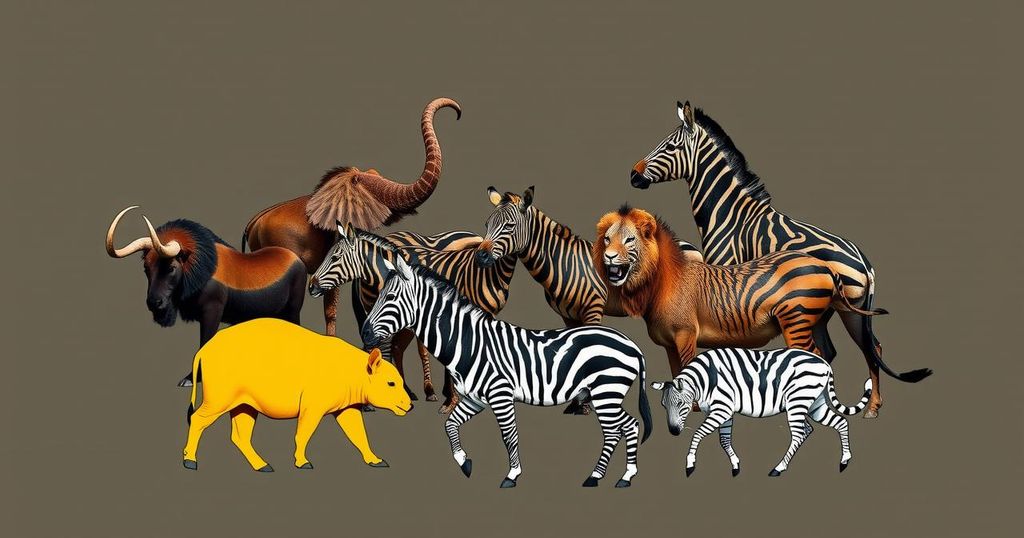A coalition of conservation organizations condemns Namibia and Zimbabwe’s plans to cull thousands of elephants and other wildlife amid claims of addressing food security and human-wildlife conflicts, arguing that these actions jeopardize endangered species and ecosystems without providing sustainable solutions.
A coalition of animal protection and conservation organizations, prominently including World Animal News, Peace 4 Animals, Born Free USA, and Born Free Foundation, has expressed alarm over Namibia and Zimbabwe’s alarming decision to cull significant numbers of wildlife, notably elephants. In August 2024, Namibia’s initial plan to cull 723 wild animals escalated to 1,002, with Zimbabwe announcing the killing of at least 200 elephants soon after. These drastic measures are presented as necessary for aiding drought-stricken communities but are underpinned by deeply concerning implications for the survival of these iconic species and the health of ecosystems. The organizations assert that the justification for culling—providing meat for communities, alleviating land and water pressures, and addressing human-elephant conflict—masks the potential devastation to vulnerable wildlife populations and ecosystems. They emphasize that such culling strategies are fundamentally unsustainable and fail to offer true food security during prolonged drought periods. Furthermore, distributing meat from wildlife could lead to increased poaching and illegal wildlife trade, exacerbating the situation for endangered species. Moreover, it is claimed that killing wildlife does not mitigate human-wildlife conflicts; instead, it endangers already fragile animal populations, disrupts social structures within species such as elephants, and can lead to increased aggression toward humans. The slaughter poses additional risks, including undermining international bans on ivory trade due to the accumulation of tusks, a worry further intensified by recent trends in Namibia and Zimbabwe to ease these restrictions for profit. The proposed culls threaten vital tourism sectors that are crucial for economic stability. In Zimbabwe, for example, eco-tourism generates substantial revenue dependent on robust wildlife populations. The recent plans represent a significant policy reversal, harking back to similarly criticized practices from the mid-20th century. Experts note that Zimbabwe’s savanna elephants are categorized as Endangered, and despite claims about population growth, evidence disproves assertions of overpopulation, reflecting instead stability since 2014. There is a clear need for countries facing drought to pivot towards humane and sustainable solutions, such as delegating resources to support grain distribution and alternative conflict resolution strategies rather than resorting to culling wild animals. The coalition urges the African governments to abandon their culling initiatives in favor of compassionate and sustainable measures benefiting both human communities and wildlife. Furthermore, they appeal to donor nations to ensure that aid is conditionally linked to the execution of effective strategies for food security and wildlife preservation.
The ongoing severe drought in southern Africa has significantly impacted both human communities and wildlife. This environmental crisis has led governments like Namibia and Zimbabwe to propose extreme measures to control wildlife populations, particularly elephants, under the pretext of supporting food security for affected communities. However, this response raises ethical and ecological concerns regarding the long-term implications for these endangered species and the ecosystems they inhabit. Thus, stakeholders from various animal protection and conservation organizations have united to counter these policies and advocate for more humane and sustainable alternatives.
In summary, the coalition’s efforts highlight the dangers of culling wildlife as a misguided solution to ecological and humanitarian issues in southern Africa. The unsustainable strategy of slaughtering elephants not only threatens biodiversity but jeopardizes the economic viability of tourism sectors reliant on healthy wildlife populations. As the situation unfolds, it is critical for governments to prioritize humane approaches that protect vulnerable species and promote coexistence between humans and wildlife, particularly in the face of climate-induced challenges.
Original Source: www.zawya.com







